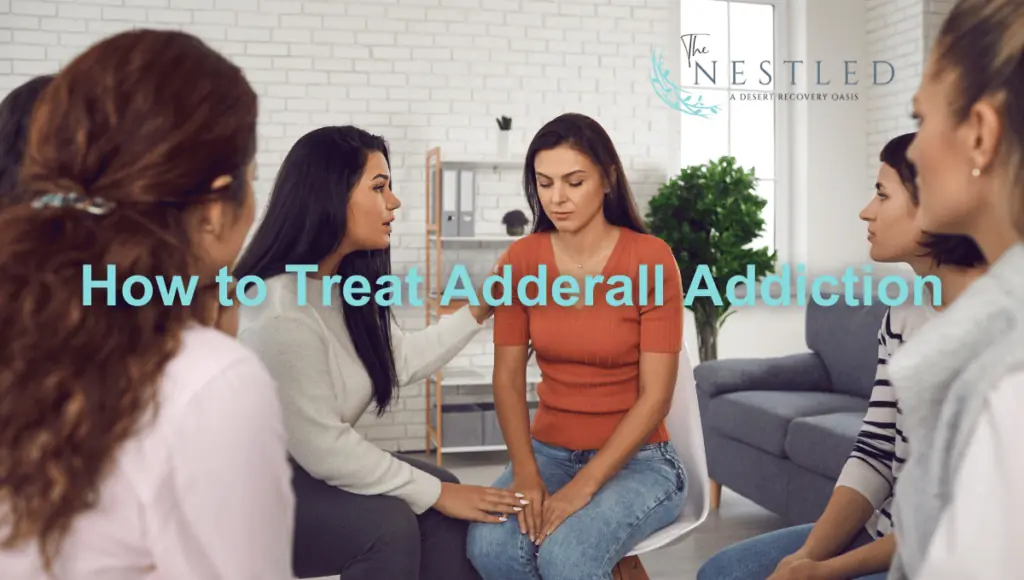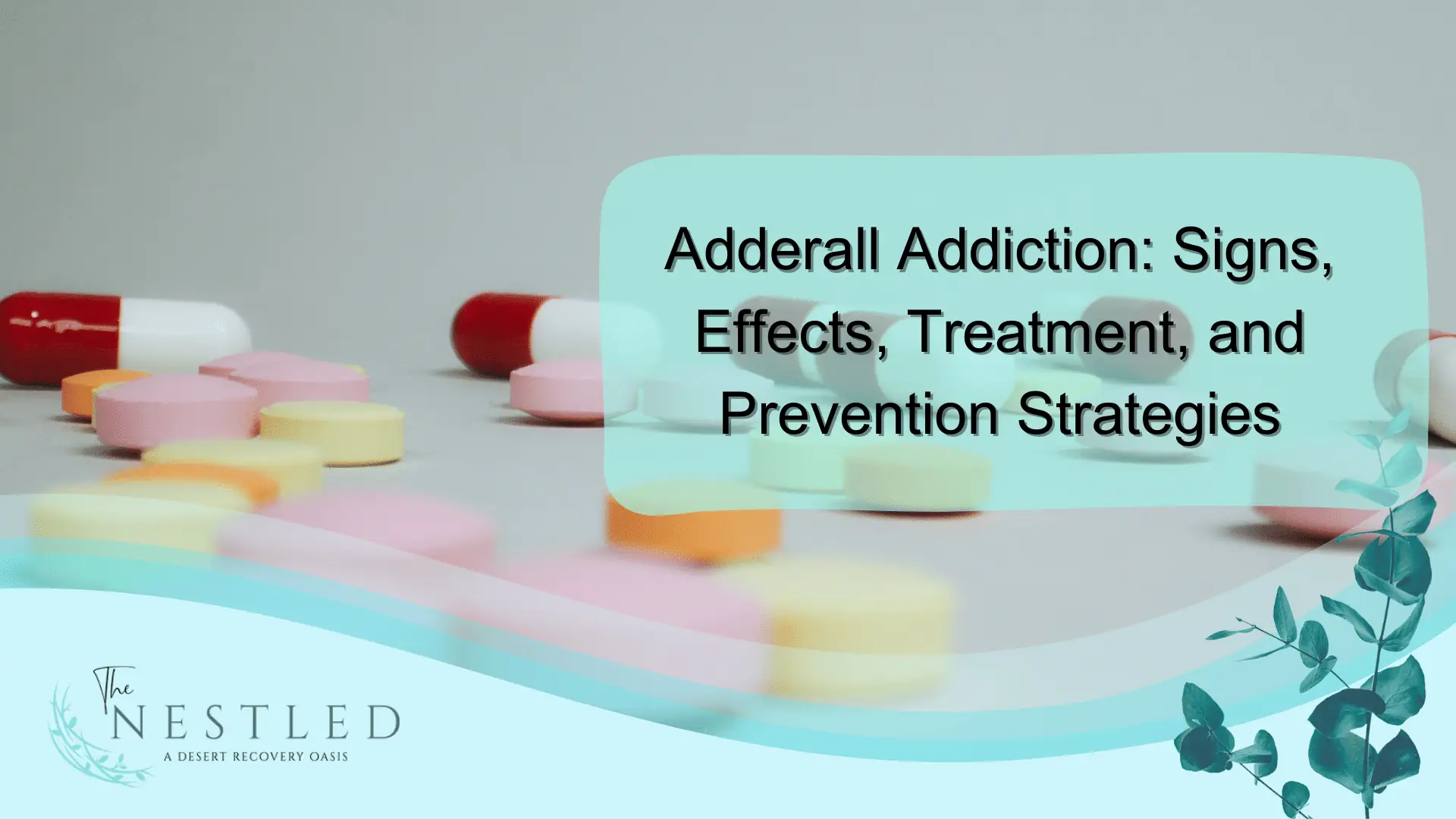Adderall addiction is the compulsive and harmful misuse of the medication and is characterized by a range of signs and symptoms. These signs may include a strong craving for Adderall, an inability to control or reduce its use, and experiencing withdrawal symptoms when attempting to quit.
The effects of Adderall addiction may lead to rapid heart rate, insomnia, weight loss, anxiety, agitation, irritability, and paranoia. It can also strain relationships and adversely impact academic or work performance.
You can treat Adderall addiction through comprehensive approaches which often involve detoxification, behavioral therapies, and support groups. These interventions help address the underlying causes of Adderall addiction, develop healthier coping mechanisms, and provide ongoing guidance and encouragement.
Prevention of Adderall addiction is important and can be achieved through various strategies like awareness programs about the risks and dangers of misuse. Healthcare providers also play a huge role in prescribing Adderall responsibly and exploring alternative treatments when appropriate.
What is Adderall Addiction?
Adderall addiction is a condition identified by the irresistible use of Adderall, a prescription stimulant medication commonly prescribed to manage symptoms of attention deficit hyperactivity disorder (ADHD). It involves a persistent, uncontrollable craving for Adderall and an inability to regulate or reduce its use.
People with Adderall addiction may continue to use the medication despite experiencing negative consequences in multiple areas of their lives, including physical health, mental well-being, relationships, and academic or work performance.
Adderall addiction typically develops as a result of prolonged misuse of the medication. Adderall contains amphetamine salts, which stimulate the central nervous system, increasing focus, attention, and energy levels.
When taken as prescribed, Adderall can be beneficial for individuals with ADHD. However, the wrong use of Adderall, such as taking higher doses than prescribed, using it without a legitimate medical need, or using it through non-prescribed routes (e.g., snorting or injecting), can lead to severe addiction.
The abuse of Adderall often begins with people seeking its perceived benefits, such as enhanced focus, increased productivity, or a temporary euphoric feeling.
Over time, the brain can develop a tolerance to the drug, requiring higher doses to achieve the desired effects. This cycle of increasing dosage and dependence can lead to addiction, as the brain becomes reliant on Adderall to function normally.
Signs of Adderall Addiction
The signs of Adderall addiction can vary from person to person, but there are several common indicators to watch for. It’s important to note that experiencing one or two of these signs does not necessarily mean someone is addicted to Adderall, but multiple signs occurring together may suggest a problem. Here are some signs to be aware of:
1. Compulsive drug-seeking behavior
People with Adderall addiction may engage in various strategies to acquire the drug. This can include doctor shopping, which involves visiting multiple healthcare providers to obtain multiple prescriptions for Adderall.
The drive to obtain Adderall can become all-consuming for individuals with addiction. They may spend significant amounts of time and effort in pursuit of the drug. This can involve making frequent trips to different pharmacies, forging prescriptions, or manipulating healthcare professionals to obtain larger quantities of Adderall than prescribed.
2. Loss of control
When someone develops an addiction to Adderall, their brain becomes dependent on the drug to function normally. Continued use of Adderall leads to changes in the brain’s reward system, resulting in a heightened desire for the drug.
Despite recognizing the negative consequences of Adderall addiction, individuals may struggle to cut back or quit using the drug. They may repeatedly attempt to control their usage or stop altogether but find themselves unable to do so.
3. Withdrawal symptoms
Withdrawal symptoms occur when someone with Adderall addiction attempts to quit or significantly reduce their use of the drug. These symptoms arise due to the body and brain adjusting to the absence of Adderall, which they have become dependent on.
Withdrawal symptoms can vary in intensity and duration depending on factors such as the individual’s level of addiction, duration of use, and dosage. Common withdrawal symptoms experienced during Adderall withdrawal include fatigue, depression, increased appetite, sleep disturbances, etc.
4. Tolerance
The regular use of Adderall makes the brain go through changes to maintain stability in response to the drug’s effects. The brain’s neurons adapt by reducing their sensitivity to the stimulant properties of Adderall. As a result, the same dosage that initially produced noticeable effects may become less effective over time.
To compensate for the reduced sensitivity, an addict may increase their Adderall dosage without medical supervision. This can lead to a cycle of needing progressively higher doses to achieve the desired effects, perpetuating the development of tolerance.
5. Neglecting responsibilities
Abusing Adderall can cause one to neglect important responsibilities in various areas of their lives. This neglect is often a direct consequence of the addictive behavior and the way it interferes with their ability to function effectively.
For example, a person can choose to misuse Adderall as a study aid or performance enhancer due to its stimulant effects. Nonetheless, as addiction takes hold, they may find it challenging to maintain their academic or job performance. They may struggle to focus, complete assignments or tasks, and meet deadlines. This decline in performance can lead to lower grades, academic probation, disciplinary actions, or even job loss.
What Causes a Person to be Addicted to Adderall?
There isn’t a singular cause that can explain why a person becomes addicted to Adderall. Addiction is a complex condition influenced by a combination of genetic, biological, environmental, and psychological factors. Let’s get into the details below:
- Certain genetic variations can make some people more vulnerable to developing substance use disorders, including being addicted to Adderall.
- Environmental influences growing up in an environment where Adderall misuse is normalized or where there is a history of substance abuse.
- Using Adderall to manage co-occurring mental health disorders without obtaining a prescription from a doctor.
- Using Adderall to improve academic or work performance or to experience the pleasurable effects it provides.
- Psychological factors, such as stress, low self-esteem, impulsivity, and difficulty coping with emotions.
What are the Side Effects of Adderall Addiction?
Adderall addiction has a range of side effects, which can vary in severity depending on the individual and their pattern of use. Here are some common side effects associated with abusing Adderall:
1. Physical Health Effects
- Adderall is a stimulant that can elevate heart rate and blood pressure, which can put a strain on the cardiovascular system.
- Interference with sleep patterns, leading to difficulty falling asleep or staying asleep.
- Suppression of appetite, which leads to weight loss and nutritional deficiencies.
2. Psychological and Behavioral Effects
- Increased feelings of anxiety and irritability, leading to heightened stress levels and difficulty managing emotions.
- Restlessness, fidgeting, or an inability to relax while under the influence of Adderall.
- Contributes to mood swings, including periods of euphoria followed by crashing lows or irritability.
3. Social and Interpersonal Effects
- Leads to strained relationships with family, friends, and colleagues due to changes in behavior, priorities, and reliability.
- Causes a person to withdraw from social activities and isolate themselves to prioritize drug use or due to feelings of shame or guilt associated with addiction.
- Leads to financial struggles due to the high cost of obtaining the drug or impaired job performance and loss of employment.
It’s important to note that these side effects can have significant impacts on an individual’s overall well-being, functioning, and quality of life. If you or someone you know has experienced any of these effects, then it may be time to seek help.
How to Treat Adderall Addiction

Treating Adderall addiction usually involves a thorough approach that tackles the physical, psychological, and behavioral aspects of addiction. Here are some common treatment approaches used for Adderall misuse:
1. Medical Detoxification
The first step in treating Adderall addiction is often medical detoxification. Under the supervision of healthcare professionals, the individual gradually tapers off the drug to minimize withdrawal symptoms and safely remove it from their system. This process helps manage the physical aspects of dependency.
2. Behavioral Therapies
Various behavioral therapies are effective in treating Adderall addiction. These therapies aim to modify unhealthy thoughts, behaviors, and patterns associated with addiction. Cognitive-behavioral therapy (CBT) is commonly used to identify and change harmful thought patterns and develop coping skills, while contingency management focuses on rewarding positive behaviors and discouraging drug use. The therapist may also use motivational interviewing to help individuals find intrinsic motivation to change their addictive behaviors.
3. Support Groups
Participation in support groups, such as 12-step programs like Narcotics Anonymous (NA), can provide a supportive and understanding community of individuals in recovery. These groups offer a platform to share experiences, receive guidance, and build a network of sober peers.
4. Individual Counseling
Individual counseling sessions with an addiction counselor or therapist can provide personalized support and guidance. These sessions may focus on addressing underlying issues, developing relapse prevention strategies, and exploring healthier coping mechanisms.
5. Medication-Assisted Treatment (MAT)
In some cases, medication-assisted treatment may be used to support recovery from Adderall addiction. Medications such as bupropion or certain antidepressants may be prescribed to manage withdrawal symptoms, reduce cravings, and stabilize mood.
6. Dual Diagnosis Treatment
If co-occurring mental health disorders are present, such as ADHD or anxiety, it is crucial to address these conditions concurrently. Dual diagnosis treatment involves integrating addiction treatment with mental health care to comprehensively address both issues.
How to Prevent Adderall Addiction
Preventing Adderall abuse involves different strategies focused on education, responsible use, and addressing risk factors. Here are some ways to help prevent Adderall addiction:
- Educate yourself and others about the potential risks and dangers associated with Adderall use.
- If you have been prescribed Adderall, follow the prescribed dosage and schedule provided by your healthcare professional. Do not increase the dosage or frequency without consulting your doctor.
- Maintain open and honest communication with your doctor about your medication use.
- Do not use Adderall for non-medical purposes or share your prescription medication with others.
- Engage in activities such as exercise, mindfulness, relaxation techniques, or hobbies that help you relax and reduce stress without relying on medication.
- If you have an underlying mental health condition like ADHD, anxiety, or depression, seek appropriate diagnosis and treatment from a qualified healthcare professional.
By adopting a proactive and responsible approach to medication use, along with addressing underlying issues and maintaining a healthy lifestyle, you can reduce the risk of Adderall addiction.
Does Adderall Affect Memory?
Yes, Adderall can affect memory in different ways. In the short term, it can improve focus, attention, and concentration, which indirectly benefits memory. It also enhances working memory, aiding tasks requiring temporary information storage.
Adderall’s impact on long-term memory is less clear, with mixed research results on memory consolidation. Its effects depend on dosage and individual factors; higher doses may impair memory due to overstimulation.
How do the patterns of substance use initiation and progression differ between individuals with Adderall addiction and those with heroin addiction?
Adderall addiction often starts with recreational or non-medical use among young adults seeking enhanced focus, energy, or academic performance, with progression driven by increasing tolerance and dependence. In contrast, heroin addiction frequently begins with experimentation or misuse of prescription opioids, leading to heroin use due to its lower cost and accessibility.
The progression of heroin addiction is often characterized by escalating use to alleviate physical and psychological withdrawal symptoms, as well as the development of tolerance and compulsive drug-seeking behavior. Despite these differences, both Adderall and heroin addiction share the potential for severe physical and psychological dependence, as well as significant social and health consequences.
Find Hope and Healing With The Nestled
Are you tired of the grip that Adderall addiction has on your life? If so, then you should understand that recovery is possible with the right support, commitment, and a thorough treatment approach.
At The Nestled Recovery Center, we understand the pain and struggle you’re going through, and we’re here to offer you a lifeline toward lasting recovery. Our dedicated team of experienced professionals is committed to providing you with the compassionate care and support you deserve.
We also create a safe and nurturing environment where you can heal, grow, and rediscover your true self. Through our holistic approach, we not only focus on overcoming addiction but also on rebuilding your physical, emotional, and spiritual well-being. The path to recovery starts here, at Nestled Recovery Center. Contact us today to get started.








